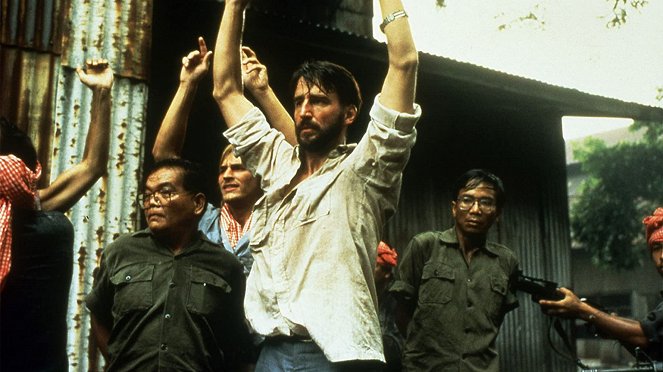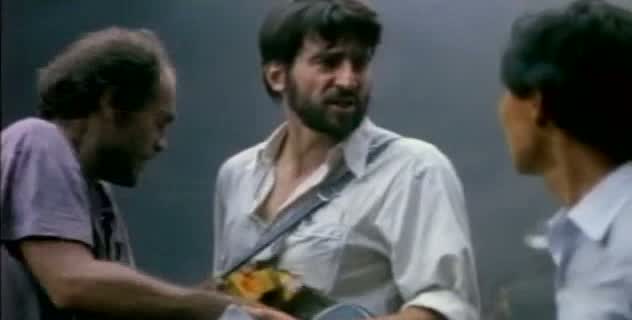Directed by:
Roland JofféScreenplay:
Bruce RobinsonCinematography:
Chris MengesComposer:
Mike OldfieldCast:
Sam Waterston, Haing S. Ngor, John Malkovich, Julian Sands, Craig T. Nelson, Spalding Gray, Bill Paterson, Athol Fugard, Mark Long, Patrick Malahide (more)Plots(1)
A photographer is trapped in Cambodia during tyrant Pol Pot's bloody "Year Zero" cleansing campaign, which claimed the lives of two million "undesirable" civilians. (official distributor synopsis)
Videos (1)
Reviews (9)
There is nothing difficult to understand about the premise of this film. The main motive is the friendship of a professional journalist who tries to map the events in Cambodia and a local who takes him around this mysterious and beautiful country. Unfortunately, at a time when the Khmer Rouge are trying to seize the government. A story that only real life could have written. When we add in the precise camera and the fact that the Khmers carried out purges that would make even Hitler green with envy, trust me it’s not a pleasant viewing experience. The first half lets you navigate yourself in the events, but the second shows true evil. It baffled me that anyone would participate in such atrocities. It was horrifying, not only visually in some scenes but also in terms of the psychology of certain characters. It’s been a long time since I spent two hours just gaping at some film in total stupor.
()
Although it’s rather misleading that historical films of this kind receive high ratings automatically and partly because they exist, this morally worthy and emotionally charged gem basks in praise, and rightly so. It’s very painful to see all the heinous acts that people are capable of doing to others, and it’s even more painful with the virtuoso Roland Joffé, the famous creator of the no less appealing, artistically intoxicating The Mission, behind the camera. He was able to materialize the atmosphere of occupied Cambodia, the conflict of the power of love and friendship with pure human suffering and the unadulterated joy at the moment when John Lennon launched his "Imagine" so perfectly that I could almost say "yes, I was there". So, yes, this film deserves all the high ratings, simply because it exists. 95%
()
How is it possible that such powerful content can be expressed through masterful form? With this film, a picture often says more than a few thousand words. Rather than an uncompromising anti-communist agitprop, The Killing Fields is a gripping story about the distressing reunion of two lifelong friends. With great distinctiveness and candor, the first half skillfully captures the disarray of a state affected by the clenched fist of the communist revolution. The second half then shows with what coldness the social stratum of intelligence can be liquidated. The relentlessness of the labor camp, from which there is essentially no escape, then escalates into horrifying images dominated by a little girl with a blue plastic bag, and the subsequent transition to the "killing field." The ending becomes even more powerful and emotional, causing even the toughest person to momentarily forget their toughness and be deeply moved.
()
The first half of the film wasn't uninteresting and I can't say that nothing happened in it, but compared to the second half it was really weak and overly ordinary. I also have some reservations about Oldfield's music, which fits the plot like a glove in places (quiet passages or the dramatic evacuation), but at other times it sticks out and distracts from the film (the captivity of the journalists, for example). As I've already said, everything that is worth seeing in the film happens in the second half - Dit Pran wanders Cambodia (here Rolland Joffé was obviously preparing for the upcoming Mission), Schanberg watches TV at home with Vincero playing, Schanberg searches for Pran... And then, of course, the beautiful ending (of course I feel bad for Lennon). Three and a half.
()
Roland Joffé was at the peak of his strength in the mid-1980s, and this can very much be felt in The Killing Fields. The pathos and urgency imbued double story of an American journalist and his Cambodian colleague, left to the mercy of the Khmer Rouge in the 1970s, has a very clear moral message that, surprisingly, criticizes the traditionally empathetic American foreign policy far more than the incomprehensible Khmer Rouge fanaticism. The most powerful weapon of The Killing Fields is certainly not the fairly simple and straightforward story, but rather the atmosphere and perfect evocation of the time when the West was fleeing and the Reds were approaching Phnom Penh from the rice fields. One of Joffé’s directing highlights is a multi-layered reflection on events – a documentary played from a video, Sam Waterston's desperate eyes and Puccini's bitter aria Nessun Dorma. Powerful. So powerful that even Lennon's final "Imagine" cannot compete with the moment of awareness of absurdity, injustice, and hopelessness. From my perspective, the film could have been a few dozen minutes longer, because the passages from the Ankha camp are absorbing and extremely interesting. Unfortunately, it is also incomplete, too curt and sometimes unnecessarily tendentious (the truly "flash" episode with the baby boy). Although, similarly to Stone's Platoon, this is a literal and manipulative film, the theme and performance represent a delicacy that I had experienced in a spectator trance. The style in which Joffé involuntarily incorporates suffering and brutality into the story reflects some of the coldness and disinterest of the mass media... and that's why it sounds like a desperate cry. Certainly not a flawless film, but undoubtedly a powerful viewing experience for anyone interested in red totalitarianism.
()
Gallery (75)
Photo © Warner Bros. Pictures



Ads